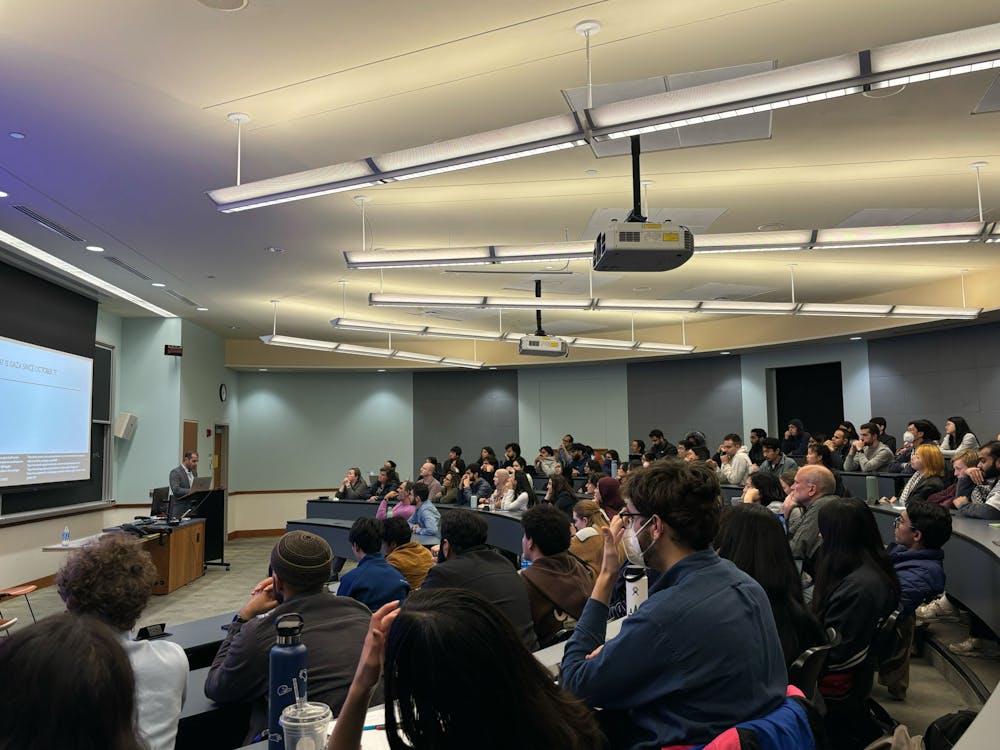The Program in International Studies hosted Dr. Feroze Sidhwa to discuss his experiences serving as a general, trauma and critical care surgeon at the European Hospital in Gaza on Tuesday, Nov. 19. This talk was co-sponsored by the Program in East Asian Studies; the Program in Islamic Studies; the Bloomberg School of Public Health’s Center for Public Health and Human Rights; and the Program in Medicine, Science and the Humanities.
Sidhwa received his medical degree from the University of Texas Health Science Center at San Antonio and a master’s of Public Health from the Harvard T.H. Chan School of Public Health. Sidhwa volunteered at the European Hospital in Khan Younis, Gaza in March and April of 2024.
After returning to the U.S., Sidhwa has been engaging in efforts to raise awareness of the lack of medical care available for Palestinians. He participated in an uncommitted movement panel at the Democratic National Convention, published an article in Politico detailing patient encounters in Gaza and organized nearly 100 doctors to sign a letter urging President Joe Biden to end U.S. military support to Israel.
Sydney Van Morgan, director of the Program in International Studies, described the importance and purpose of Sidhwa’s talk in an email to The News-Letter.
“We wanted to offer the campus community a discussion of the situation in Gaza based on the fact on the ground by someone who has experienced the health crisis first hand,” she wrote. “Dr. Sidhwa is a JHU alum (PHS) who reached out to us offering to speak. Once we familiarized ourselves with his work, we knew he was exactly the expert we needed.”
Sidhwa began his presentation by analyzing Gaza, a small strip of land that is denser than New York City and incredibly poor. He stated that about half of the population is unemployed, over three-fourths of the population are dependent on humanitarian aid and that the area has been under intense military occupation. He further described that, according to the United Nations, Gaza is the deadliest place in the world for aid workers.
Sidhwa stated he was shocked by the reality of the devastation in Gaza and described how conflict surrounded him during his time there.
“Almost 100 percent of Gaza’s population is homeless and displaced,” he said. “[Gaza] is far worse than in Aleppo, Mariupol or even Dresden and Rotterdam during World War Two.”
Sidhwa continued by describing Gaza as the hungriest and thirstiest place in the world. He stated that every individual only has access to less than four liters of water every single day to use for all their needs.
Sidhwa then introduced two medical cases of patients that he worked on during his time in Gaza. The first case was of a nine-year-old girl who was caught in an explosion with multiple injuries; Sidhwa described that a part of her femur was missing and multiple of her bones were exposed. He explained that she had septic symptoms.
After hours working with a team of surgeons, Sidhwa and others were able to stabilize her enough to be transported to Egypt for better medical attention. According to Sidhwa, the young girl will likely need to undergo anywhere from 20 to 30 operations during her lifetime to survive. He emphasized that this girl’s case was not unique and highlighted that thousands like her remain in Gaza.
In an interview with The News-Letter, a freshman who attended the event, Aufa Bajwah spoke about how he was moved by Sidhwa’s presentation of medical cases.
“I think [this talk] definitely gave a very human aspect aspect to [the news] because I think a lot of us see the numbers,” he said. “It felt important to hear firsthand from someone that has that experience and hear anecdotal experiences.”
In another case, Sidhwa described a 29-year-old male who had a gunshot wound and who he believed had also experienced torture. Sidhwa stated that the man was working as a nurse in a hospital when an Israeli soldier walked into the hospital he worked in and shot him in the knee. Sidhwa stated that the man was then kidnapped by the Israeli military, where he faced 45 days of brutal torture, and eventually had to have an eye removed as a result of the beatings.
Sidhwa expressed frustration at the suffering of a civilian at the hands of the soldiers’ actions.
“What was the point of breaking this man — this man who spent his life trying to heal others?” Sidhwa asked.
According to Sidhwa, these cases illustrate that the healthcare system in Gaza is undermined by direct attacks on healthcare workers and facilities and also massively overwhelmed by enormous needs. Sidhwa underscored that malnutrition, destruction of water, sanitation and hygiene infrastructure, and overcrowding make surgical successes nearly impossible.
In the experiences of Sidhwa and his coworkers, it was possible to provide advanced care in a resource-poor setting at the individual level, but impossible to provide the needed care at the public health level.
“You can take all of Hopkins hospital and it still won’t be enough. No matter how much money you put in, nothing can help,” explained Sidhwa.
Sidhwa ended his presentation by emphasizing the importance of recognizing the severity of the medical cases in Gaza. He insisted that Hopkins take action and stay motivated towards Palestinians in Gaza.
Van Morgan concluded her email by explaining what she hopes the University can learn from Sidhwa’s talk and his experiences in Gaza.
“It is difficult at this moment to be hopeful about the Middle East and especially the situation in Gaza,” she wrote. “Dr. Sidhwa provided insights from his work treating trauma patients in Gaza, but more importantly he offered advice about how students can work with politicians and organizations to bring about peace. He spoke frankly about the horrific health crisis in Gaza but also left the audience feeling empowered and, at a minimum, better informed.”





